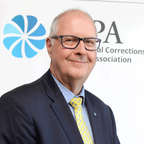CTC2025 Programme Testing
Programme can be shown for specific speakers, days or type of session
Plenary Sessions:
Tuesday 25 February
From Prison to Tech CEO; Connecting our World for Good (PID070)
10am – 11am, 25 February 2025 ‐ 1 hour
Plenary Session
In this talk, Marcus Bullock introduces his big goal to create empathy and community, with a splash of impact and tech. Marcus shares his personal journey to building a social impact company that supports families in marginalized communities. His compelling and inspiring talk will motivate each of us to find the best in our constantly evolving correctional system.Speakers

Digital Transformation Framework for Smart Prison in Indonesia (PID001)
Digital Transformation Framework for Smart Prison in Indonesia (PID001)
11.30am – 12.15pm, 25 February 2025 ‐ 45 mins
Plenary Session
Smart prisons, utilizing technologies like AI, IoT, and big data, aim to enhance correctional systems but face challenges in implementation. Unlike other sectors, prison systems need tailored approaches for digital transformation (DT). This study fills a gap by developing a Digital Transformation Framework for Indonesian prisons, grounded in the Quad-Helix model, focusing on collaboration between academia, government, and society. The framework, validated by experts, includes four dimensions: people, process, technology, and organizations - comprising 16 components and 50 factors. It was successfully tested in Central Java prisons.Speakers

Wednesday 26 February
Do Offenders Have Unique Needs in a BYO AI Future? (PID032)
9.45am – 10.30am, 26 February 2025 ‐ 45 mins
Plenary Session
Imagine a future where everyone has a personal AI that learns from their experiences and preferences. These AI agents are highly personalized and operate independently of large tech companies, offering benefits like increased privacy, security, and personalization. This concept, known as Bring Your Own AI (BYOAI), could address data privacy and sovereignty concerns but also presents challenges for the judicial system. Questions arise about whether offenders can retain and train their AI during incarceration, if data collected by AI violates privacy rights, and how to manage outside contact in a networked scenario. This session aims to discuss the implications and future needs of a BYOAI scenario for incarceration and rehabilitation, and to inform policy and advisory efforts.Speakers

Mike Sparling
Chief Operating Officer, Chief Technology Officer, Multi-Health Systems Inc., Canada
Full Programme: (collapsible layout)
Monday 24 February
Welcome Reception
Evening Events
Welcome Reception
6.30pm – 9pm ICT, 24 February 2025 ‐ 2 hours 30 mins
Evening Events

Dinner cruise

Dinner Cruise
Tuesday 25 February
ICPA: Welcome and Opening Introductions
Plenary Session
ICPA: Welcome and Opening Introductions
9.15am – 9.30am ICT, 25 February 2025 ‐ 15 mins
Plenary Session
Speakers


Host: Welcome and Opening Introductions
Plenary Session
Host: Welcome and Opening Introductions
9.30am – 9.50am ICT, 25 February 2025 ‐ 20 mins
Plenary Session
Speakers

Welcome and Opening Introductions
Plenary Session
Welcome and Opening Introductions
9.50am – 10am ICT, 25 February 2025 ‐ 10 mins
Plenary Session
Speakers

Claire McGuinness
Global Track Chair, Partner, National Security & Justice, KPMG, Australia
From Prison to Tech CEO; Connecting our World for Good (PID070)
Plenary Session
From Prison to Tech CEO; Connecting our World for Good (PID070)
10am – 11am ICT, 25 February 2025 ‐ 1 hour
Plenary Session
In this talk, Marcus Bullock introduces his big goal to create empathy and community, with a splash of impact and tech. Marcus shares his personal journey to building a social impact company that supports families in marginalized communities. His compelling and inspiring talk will motivate each of us to find the best in our constantly evolving correctional system.Speakers

Coffee Break and Exhibition
Break
Coffee Break and Exhibition
11am – 11.30am ICT, 25 February 2025 ‐ 30 mins
Break
Digital Transformation Framework for Smart Prison in Indonesia (PID001)
Plenary Session
Digital Transformation Framework for Smart Prison in Indonesia (PID001)
11.30am – 12.15pm ICT, 25 February 2025 ‐ 45 mins
Plenary Session
Smart prisons, utilizing technologies like AI, IoT, and big data, aim to enhance correctional systems but face challenges in implementation. Unlike other sectors, prison systems need tailored approaches for digital transformation (DT). This study fills a gap by developing a Digital Transformation Framework for Indonesian prisons, grounded in the Quad-Helix model, focusing on collaboration between academia, government, and society. The framework, validated by experts, includes four dimensions: people, process, technology, and organizations - comprising 16 components and 50 factors. It was successfully tested in Central Java prisons.Speakers

Introduction to Afternoon Sessions
Plenary Session
Introduction to Afternoon Sessions
12.15pm – 12.30pm ICT, 25 February 2025 ‐ 15 mins
Plenary Session
Speakers

Claire McGuinness
Global Track Chair, Partner, National Security & Justice, KPMG, Australia
Lunch Break and Exhibition
Break
Lunch Break and Exhibition
12.30pm – 1.30pm ICT, 25 February 2025 ‐ 1 hour
Break
Technology in Community Corrections (PID017)
Workshop Session
Technology in Community Corrections (PID017)
1.30pm – 2.15pm ICT, 25 February 2025 ‐ 45 mins
Workshop Session
Speakers

Joyce Wong
Assistant Director, Community Corrections Work Release Scheme (CWRS), Community Corrections Command, Singapore Prison Service, Singapore
[CANCELLED] ICT for Prison Rehabilitation: Enhancing Reintegration Through Digital Transformation (PID006)
Workshop Session
[CANCELLED] ICT for Prison Rehabilitation: Enhancing Reintegration Through Digital Transformation (PID006)
1.30pm – 2.15pm ICT, 25 February 2025 ‐ 45 mins
Workshop Session
Digital Transformation in the Irish Prison Service (PID052)
Workshop Session
Digital Transformation in the Irish Prison Service (PID052)
1.30pm – 2.15pm ICT, 25 February 2025 ‐ 45 mins
Workshop Session
• Digital Service Delivery for People in Custody – Providing access to education, healthcare, and prison services via digital platforms.
• Digital Service Delivery for Staff & Partners – Enabling smart, secure workflows for sentence management, facility operations, and prisoner engagement.
• Electronic Security of Prisons – Implementing digital security solutions.
• Digital Prison Building Management – Enhancing sustainability through automated monitoring and resource optimisation.
Speakers

Donna Creaven
Director of Corporate Services, Governance and ICT, Irish Prison Service, Ireland
Embracing European Principles: Technology and Education for a Diverse Prison Community (PID021)
Workshop Session
Embracing European Principles: Technology and Education for a Diverse Prison Community (PID021)
1.30pm – 2.15pm ICT, 25 February 2025 ‐ 45 mins
Workshop Session
This exploratory case study conducted in three Austrian penal facilities in 2022 and 2023 included 46 semi-structured interviews with 16 prison staff and 30 persons deprived of liberty (PDLs). Findings were analyzed through the lenses of andragogy and European principles of normalization, openness, and responsibility. Technology-assisted learning programs, such as university degrees and language classes, exemplified these principles, particularly for non-native speakers learning German, which facilitated education and employment opportunities during incarceration. To enhance staff buy-in and accessibility, the study suggested optimizing the ELIS learning platform with a more user-friendly interface and multilingual support. Training incarcerated university students to teach language classes could alleviate staff workload. Additionally, providing institutionally owned computers with internet access in hallways improved accessibility.Speakers

Transforming Community Corrections with Digital Technologies – A Queensland Corrective Services Case Study (PID022)
Workshop Session
Transforming Community Corrections with Digital Technologies – A Queensland Corrective Services Case Study (PID022)
2.15pm – 3pm ICT, 25 February 2025 ‐ 45 mins
Workshop Session
This presentation highlights how Queensland Corrective Services (QCS) has revolutionised offender management on parole, probation, and community supervision through a new digital platform that embodies a "Smart" approach to case management. Recognizing that isolated solutions often generate more challenges than benefits, QCS adopted an integrated system that uses multiple digital channels to reach a broader range of supervised individuals. Key innovations include biometric self-service kiosks deployed across a state bigger than Texas, a mobile app for offender self-service and biometric curfew checks, and an Officer Portal that fully integrates with the core offender record system. These advancements have transformed QCS's ability to connect with both offenders and staff.Speakers
Gender-Responsive Policies and Technology Alleviate the Plight of Filipino Women Deprived of Liberty (PID061)
Workshop Session
Gender-Responsive Policies and Technology Alleviate the Plight of Filipino Women Deprived of Liberty (PID061)
2.15pm – 3pm ICT, 25 February 2025 ‐ 45 mins
Workshop Session
There are enormous challenges in correctional facilities for women deprived of liberty (WDL). Congestion, gender-specific needs, health and nutritional concerns fall into these, which are among the main issues tackled by the author in this research. She shares her findings on how the Correctional Institution for Women (CIW), and female detention centers in the Philippines address these challenges.These correctional and rehabilitation facilities have initiatives which are gender-sensitive and in keeping with technological advancements. It is interesting to know how these Philippine custodians of WDL utilize pragmatic and creative efforts, as well as collaborative endeavors in implementing gender-sensitive policies and utilizing technology in maintaining the connections of WDL with their families.
In this presentation, the familial ties of Filipinos are highlighted in situations where the WDL, especially mothers and wives, find both strength and solace as they communicate through electronic visitation (e-visitation) with their loved ones. Even in this post-pandemic times, e-visitation is still being accorded to WDL (and other persons deprived of liberty or PDLs) in the Philippines, since majority of them are indigent; thus, their families find it hard to visit them due to financial constraints.
This research is conducted with a human rights-based approach and gender-sensitive perspective. Its empirical data are largely based on the information gathered by the author and the jail visitations teams from the Public Attorney’s Office or PAO. The efforts of PAO regarding the legal, medical, dental, and optical concerns of WDL (and other PDLs) are shared in this presentation.
Speakers


Reducing Risk in Offender Transportation with Smart Applications: Enhancing Offender Transportation Efficiency & Safety (PID012)
Workshop Session
Reducing Risk in Offender Transportation with Smart Applications: Enhancing Offender Transportation Efficiency & Safety (PID012)
2.15pm – 3pm ICT, 25 February 2025 ‐ 45 mins
Workshop Session
The complexities of managing inmate transportation, from scheduling to risk mitigation, present unique challenges for correctional facilities worldwide. By integrating transportation processes tightly within an Offender Management System (OMS), the potential to improve inmate welfare, enhance security, streamline operations, and reduce redundancy is significant.This presentation will explore how an offender management system, paired with a dedicated transportation module, addresses the growing need for intelligent, user-friendly transportation solutions that meet the operational demands of modern correctional institutions.
Through case studies and practical demonstrations, we will showcase how automated transportation planning, vehicle scheduling, and staff management, are critical for agencies looking to ensure compliance with stringent security protocols and offender/staff safety.
An integration system for offender management and transportation planning enhances decision-making through real-time data analysis, leveraging the future of artificial intelligence, and risk management supports staff with mobile applications for in-field updates, and ultimately improves the overall safety and efficiency of inmate transport.
Speakers
Coffee Break and Exhibition
Break
Coffee Break and Exhibition
3pm – 3.30pm ICT, 25 February 2025 ‐ 30 mins
Break
The Meaning of SMART for Zurich Prison & Probation Services - Implementation and Evaluation Challenges of the SMAZH - Sm (PID040)
Roundtable Workshops
The Meaning of SMART for Zurich Prison & Probation Services - Implementation and Evaluation Challenges of the SMAZH - Sm (PID040)
3.30pm – 5pm ICT, 25 February 2025 ‐ 1 hour 30 mins
Roundtable Workshops
With this presentation or interactive workshop we will unravel the meaning of SMART in the context of the Zurich (Switzerland) Smart Prison Project, by sharing the approach we took to design this SMART project from different perspectives (strategy, organization, information, technology, user and security), sharing the planning & implementation experience with the audience and the value of the acronym S.M.A.R.T. (Specific Measurable Achievable Relevant Time-Bound) in this context.Speakers

Annabelle Sersch
Senior ICT Project Manager, Directorate of Justice and Home Affairs (JI) of the Canton of Zurich, Switzerland
Jodok Senften
Senior ICT Business Analyst, Directorate of Justice and Home Affairs (JI) of the Canton of Zurich, Switzerland
The Smart Prison Starts with Smart Implementation: Getting It Right (PID008)
Roundtable Workshops
The Smart Prison Starts with Smart Implementation: Getting It Right (PID008)
3.30pm – 5pm ICT, 25 February 2025 ‐ 1 hour 30 mins
Roundtable Workshops
The traditional focus on success in the corrections technology field often overshadows the valuable lessons that can be learned from failures. This presetation aims to shift the narrative by exploring the concept of failure, both personal and organizational, in the context of technology implementations within correctional systems.Speakers

Simon Bonk
Chief Research Officer & Director New Business Development, Telio Management, Canada
SMART Looking... Looking at Smart from Different Angles (PID014)
Roundtable Workshops
SMART Looking... Looking at Smart from Different Angles (PID014)
3.30pm – 5pm ICT, 25 February 2025 ‐ 1 hour 30 mins
Roundtable Workshops
During this session, I would like to challenge the meaning of smart in the specific prison & probation session, starting from some generic concepts, definitions and existing projects.Speakers

Smart Synergies Between Government and Private Sector (PID039)
Roundtable Workshops
Smart Synergies Between Government and Private Sector (PID039)
3.30pm – 5pm ICT, 25 February 2025 ‐ 1 hour 30 mins
Roundtable Workshops
The presentation refers to all four themes of the conference with a specific focus on the “planning “ challenge. This will be shown during the different planning-layers how public sector-private sector are interacting for a better outcome.With the construction of new prisons, there are various disciplines contributing to the alignment of these with operations, users’ purposes and also the sustainability for the future.Architecture, Construction, Environment, Operational technology (OT) including security and internal processes, ICT services (IT), facilities and maintenance, etc. These disciplines are too
often separate processes. Integration from the start is a must, to be able to realize a “smart“ prison. Afterwards it is too late.
With recent realizations of Private Public Partnerships (PPP), it has become crystal clear that the synergy between these disciplines is an enormous added value for the final delivary. For this, a
far-reaching cooperation, an interaction between private partners and the public stakeholders (on behalf of the Government, Agency... ), with a client-driven approach is crucial. This challenge can only be achieved with an initial solid planning and an equally challenging implementation track.
In the tender and before the start of the project, the Governmentsets the primary requirements through a functional output specification. The Public Sector wants to be more efficient, more focused on reintegration but also cost-efficient and facilitating in the internal processes for the staff. A better safety and interaction is required. Dynamic security, also in a smart prison! How to keep the balances? How to install a flexible operating and future-proof prison with the use of innovative technology.
Security and operational technology are permanent features, but how can these make a prison smart with a responsible use of the information technology? Smart at the cutting edge of IT and OT.
Safety is paramount, but with further integration of IT, OT can give more space to user-friendliness of internal processes, more self-reliance for prisoners and better support of the staff.
Speakers

Wednesday 26 February
European Standards on AI and the Nordic Smart Prisons (PID034)
Plenary Session
European Standards on AI and the Nordic Smart Prisons (PID034)
9am – 9.45am ICT, 26 February 2025 ‐ 45 mins
Plenary Session
Speakers


Pia Puolakka
Senior Specialist, Team Leader, Prison and Probation Service of Finland, Finland

Do Offenders Have Unique Needs in a BYO AI Future? (PID032)
Plenary Session
Do Offenders Have Unique Needs in a BYO AI Future? (PID032)
9.45am – 10.30am ICT, 26 February 2025 ‐ 45 mins
Plenary Session
Imagine a future where everyone has a personal AI that learns from their experiences and preferences. These AI agents are highly personalized and operate independently of large tech companies, offering benefits like increased privacy, security, and personalization. This concept, known as Bring Your Own AI (BYOAI), could address data privacy and sovereignty concerns but also presents challenges for the judicial system. Questions arise about whether offenders can retain and train their AI during incarceration, if data collected by AI violates privacy rights, and how to manage outside contact in a networked scenario. This session aims to discuss the implications and future needs of a BYOAI scenario for incarceration and rehabilitation, and to inform policy and advisory efforts.Speakers

Mike Sparling
Chief Operating Officer, Chief Technology Officer, Multi-Health Systems Inc., Canada
Afterbreak Sessions and Afternoon Sessions Introduction
Plenary Session
Afterbreak Sessions and Afternoon Sessions Introduction
10.30am – 10.45am ICT, 26 February 2025 ‐ 15 mins
Plenary Session
Speakers

Claire McGuinness
Global Track Chair, Partner, National Security & Justice, KPMG, Australia
Coffee Break and Exhibition
Break
Coffee Break and Exhibition
10.45am – 11.15am ICT, 26 February 2025 ‐ 30 mins
Break
Towards an AI-Powered Prison: Real World Machine Learning Applications (PID023)
Workshop Session
Towards an AI-Powered Prison: Real World Machine Learning Applications (PID023)
11.15am – 12pm ICT, 26 February 2025 ‐ 45 mins
Workshop Session
This presentation will explore how innovative AI-powered digital solutions can complement any Smart Prison initiative by focusing on the practical implementation of machine learning (ML) technologies. No prior technical knowledge is required, as attendees will receive an introduction to ML technology and a live walkthrough of designing and building user-friendly, code-free ML solutions. Key demonstration topics include interactive knowledge repositories for staff, automated review and moderation of inmate communications, optimization of operations and security tasks, and providing intelligent interactive services to incarcerated individuals.Speakers

Christopher Ditto
Senior Vice President of Research & Development, ViaPath Technologies, United States
Navigating the Future: Implementing the EU AI Act in Law Enforcement and Correctional Systems with Advanced Offender Management Systems (PID072)
Workshop Session
Navigating the Future: Implementing the EU AI Act in Law Enforcement and Correctional Systems with Advanced Offender Management Systems (PID072)
11.15am – 12pm ICT, 26 February 2025 ‐ 45 mins
Workshop Session
The European Union’s Artificial Intelligence Act (Regulation (EU) 2024/1689), which came into force on August 1, 2024, and will be fully enforceable by August 2, 2026, marks a significant milestone as the world’s first comprehensive horizontal legal framework for AI regulation. This pioneering legislation addresses the critical balance between mitigating AI-related risks and promoting opportunities for innovation, establishing a robust regulatory foundation that impacts various sectors, including law enforcement and correctional agencies.
For correctional systems, the EU AI Act introduces essential compliance requirements and ethical guidelines to ensure that AI tools used in decision-making processes remain transparent, fair, and unbiased. The Act underscores the need for human oversight, particularly in contexts where AI influences decisions that affect individual rights and freedoms, such as offender management, rehabilitation, and recidivism prediction.
In alignment with the EU AI Act, the research and development behind the HORUS 360 iOMS Intelligent Offender Management System and the next-generation HORUS 360 iOMS NextGen has been meticulously guided by the regulatory principles of safety, transparency, and accountability.
This presentation explores how the AI Act influences the design and deployment of intelligent systems within correctional environments, highlighting the transformative potential of AI when governed by a balanced and forward-thinking regulatory approach.
Speakers

[CANCELLED] Revolutionizing Reintegration: AI-Powered Support for Inmate Rehabilitation, Post-Incarceration Success and Mental Health (PID036)
Workshop Session
[CANCELLED] Revolutionizing Reintegration: AI-Powered Support for Inmate Rehabilitation, Post-Incarceration Success and Mental Health (PID036)
11.15am – 12pm ICT, 26 February 2025 ‐ 45 mins
Workshop Session
Blending Technology with Decision Making and the Distribution of Relevant Data (PID143)
Sponsor Presentation
Blending Technology with Decision Making and the Distribution of Relevant Data (PID143)
11.15am – 12pm ICT, 26 February 2025 ‐ 45 mins
Sponsor Presentation
The speech will focus on three core platforms and the outcomes they support:
- A new approach to the issue of illegal mobiles in corrections and the ability to pinpoint the location and have the choice to disrupt the device - or allow the continued use and acquire intelligence.
- The inmate management process from sentencing to rehabilitation including medical, educational and behavioural assessments + all visitation and payphone recordings, transcripts and sentiment analysis. Supporting a deeper profiling of each inmate.
- The rehabilitation process to include electronic monitoring and criminal biometrics designed to support offenders as they return to the community.
The focus of the speech is supporting inmates in the overall correctional process with minimal additional overhead for the corrections.
Speakers

A Novel Implementation of an AI-Based Behavior and Life Sign Recognition System Within a Correctional Environment (PID029)
Workshop Session
A Novel Implementation of an AI-Based Behavior and Life Sign Recognition System Within a Correctional Environment (PID029)
12pm – 12.45pm ICT, 26 February 2025 ‐ 45 mins
Workshop Session
A novel effort has been undertaken in Canada to implement an AI-based system for the real-time monitoring of behavioral and health conditions of inmates. The system has, for the first time, been deployed in a real environment and is being assessed for early detection of anomalous health and self-harm events. However, above and beyond this, the technology also offers opportunity for the long-term behavioral assessment and trending analysis that can provide quantitative measures to decision-makers. In this presentation, early results of the deployed system and user feedback are presented to gauge this technology's value proposition in a correctional context. A special focus is also given to the special legal and ethical challenges, such as privacy, inherent in the adoption of advanced data-gathering technologies.Speakers
Leveraging Funeral Streaming Technology to Enhance Correctional Safety and Support Inmate Mental Health (PID041)
Workshop Session
Leveraging Funeral Streaming Technology to Enhance Correctional Safety and Support Inmate Mental Health (PID041)
12pm – 12.45pm ICT, 26 February 2025 ‐ 45 mins
Workshop Session
Funeral streaming technology offers a compassionate approach to supporting inmate mental health, allowing them to virtually attend family funerals in a secure, supervised setting. This innovative solution helps inmates manage grief, reducing behavioral incidents by up to 30% and contributing to safer correctional environments. By fostering emotional stability and promoting trauma-informed care, funeral streaming encourages engagement in rehabilitative programs, ultimately supporting successful reentry and lowering recidivism rates.This workshop is designed for correctional leaders, technology specialists, and mental health professionals, providing practical guidance, case studies, and strategies for implementing funeral streaming technology.
Attendees will learn about logistical, security, and partnership considerations to make this service accessible. By enabling inmates to maintain family connections, facilities can cultivate a more rehabilitative
process.
Speakers

Lessons from a Successful Smart Prison System Implementation: A Collaborative Conversation with Top Executives (PID152)
Sponsor Presentation
Lessons from a Successful Smart Prison System Implementation: A Collaborative Conversation with Top Executives (PID152)
12pm – 12.45pm ICT, 26 February 2025 ‐ 45 mins
Sponsor Presentation
Join a candid, open discussion where a former Chief Information Officer and former Commissioner for the Indiana Department of Correction share hard-earned insights from their journey implementing a successful smart prison system.
Hear how they turned past failures into the bridge for success--what worked, what didn’t, and the essential lessons you need to lay the right foundation. Learn practical strategies, common pitfalls to avoid, and set yourself up for a seamless and effective implementation.
Speakers

Rick Davis
Thought Leadership Director and Corrections Technology Subject Matter Expert (SME), Mi-Case Corporation, United States

Lunch Break and Exhibition
Break
Lunch Break and Exhibition
12.45pm – 1.45pm ICT, 26 February 2025 ‐ 1 hour
Break
Integrating SMART Data into Collaborative Correctional Intelligence Practice (PID024)
Workshop Session
Integrating SMART Data into Collaborative Correctional Intelligence Practice (PID024)
1.45pm – 2.30pm ICT, 26 February 2025 ‐ 45 mins
Workshop Session
With the introduction of SMART prisons will come the inevitable growth and challenge of bulk data and the need to develop innovation solutions to leverage this data for the protection of people in prison, their visitors and staff.
This session will also provide some considerations for technological skillsets needed to future proof correctional intelligence tradecraft and ensure innovation in recruitment and professional development practices.
Speakers


Robotic Process Automation for Operations and Corporate Services (PID016)
Workshop Session
Robotic Process Automation for Operations and Corporate Services (PID016)
1.45pm – 2.30pm ICT, 26 February 2025 ‐ 45 mins
Workshop Session
As Singapore Prison Service leverages more technologies and data are resided in different systems, integration between systems can become more complex which require time and effort to complete. Robotic Process Automation (RPA), as a quick-win solution, is being deployed to enhance efficiency of officers who need to work on the data of different systems when performing operational or corporate services tasks such as updating records, performing administrative checks, or generating statistics on regular basis.Speakers

Annanthan Jaiy Santosh
Staff Officer, Transformation & Technology Planning, Singapore Prison Service, Singapore
The Contribution of Smart Cards to a Smart Prison (PID027)
Workshop Session
The Contribution of Smart Cards to a Smart Prison (PID027)
1.45pm – 2.30pm ICT, 26 February 2025 ‐ 45 mins
Workshop Session
The themes functionality, user-friendliness, sustainability and intelligent technology are important topics in the realization and the planning. The step-by-step plan and the synergy are the driving force.
Speakers

The Development and Implementation of New Digital Systems and the Implications on the Norwegian Correctional Service (PID031)
Workshop Session
The Development and Implementation of New Digital Systems and the Implications on the Norwegian Correctional Service (PID031)
2.30pm – 3.15pm ICT, 26 February 2025 ‐ 45 mins
Workshop Session
The Norwegian Correctional Service have a big focus on modernizing ourselves with the use of digitalization. We have several digitalization projects that will have an impact on our staff, offenders and the families and friends of inmates. Examples of this are the use of electronic monitoring for custody, a more modern system for the school services for inmates (Utvei), a new OMS system and a digital self service system for inmates.Our biggest projects is a new OMS system. Norwegian Correctional Service have been using 5 different systems daily to manage and operate everyday life in the correctional service. One of the main challenges in this scenario is the fact that probation and prisons use different system that do not naturally interact with each other. This has made cooperation between staff and sharing of necessary information difficult. The use of our new OMS system together with our other digitalization projects will have an impact on daily life in prison and probation.
Speakers
Nirushanthy Nordli
Project Director, The Directorate of the Norwegian Correctional Service, Norway

Jan-Erik Sandlie
Deputy Director General, The Directorate of the Norwegian Correctional Service, Norway
The Advancement of Smart Prison Towards Data-Driven Management in the HKCSD (PID026)
Workshop Session
The Advancement of Smart Prison Towards Data-Driven Management in the HKCSD (PID026)
2.30pm – 3.15pm ICT, 26 February 2025 ‐ 45 mins
Workshop Session
Since the Strategic Plan was formulated in 2018, the Hong Kong Correctional Services Department (HKCSD) has been actively developing the “Smart Prison” concept for process innovation and sustainable development through the application of technology and digitalisation. Over the years, numerous innovative technology projects that enhance security, streamline operations and promote rehabilitation of persons in custody (PICs) have been developed under the “Smart Prison” concept at various correctional institutions.With the advancement of technology, the limitations of siloed information technology (IT) and “Smart Prison” systems have become apparent while the need for systematic and continuous data collection among systems is rising. Faced with the challenges of breaking the “bottlenecks” of integrating centralised operational systems into various Smart Prison systems as well as further developing Smart Prison systems in view of the restrictions imposed by ageing facilities, it is imperative to adopt a more integrated approach. To advance towards enhancing digital and smart management, and leveraging the implementation of the Integrated Custodial and Rehabilitation Management System (iCRMS) in 2023 which forms the core of data collection and application within the Department, the HKCSD plans to develop future IT and “Smart Prison” systems in a more proactive and integrated approach for centralisation of data collection, application and analytics. Combining operational systems and IT systems to collect data on various aspects for analysis and application, the introduction of advanced analytic tools for predictive analysis based on the learned patterns can be achieved. All in all, the implementation of “Smart Prison” systems and the launch of the iCRMS signify a milestone of the HKCSD and pave the way for the next phase of “Smart Prison”, namely the advancement of “Smart Prison” towards data-driven management and big data analysis.
Speakers
Cheuk-yin Patrick CHU
Principal Officer (Smart Prison), Hong Kong Correctional Services Department, Hong Kong
Exploring the Potential and the Impacts of the Deployment of Digital Devices on People in Custody (PID025)
Workshop Session
Exploring the Potential and the Impacts of the Deployment of Digital Devices on People in Custody (PID025)
2.30pm – 3.15pm ICT, 26 February 2025 ‐ 45 mins
Workshop Session
Since 2020, incarcerated people in some Australian jurisdictions were provided with digital devices to address the digital divide, decrease punitiveness associated with incarceration and alleviate the compounded isolation caused by the COVID-19 pandemic. The digital sphere could thus represent a new space that allows incarcerated people autonomous access to services, facilitating family connections and entertainment. We will begin by identifying some key deprivations of imprisonment in the prison literature, after which we explore how particular technological provisions address or overlook the pains of imprisonment incarcerated people typically experience. Following this, we outline the relevant policy changes and review empirical findings regarding providing digital technology to people in prison within Australia and overseas. Finally, several relevant policy recommendations are discussed.Speakers



Coffee Break and Exhibition
Break
Coffee Break and Exhibition
3.15pm – 3.45pm ICT, 26 February 2025 ‐ 30 mins
Break
Closing Panel
Plenary Session
Closing Panel
3.45pm – 4.30pm ICT, 26 February 2025 ‐ 45 mins
Plenary Session
Speakers

Claire McGuinness
Global Track Chair, Partner, National Security & Justice, KPMG, Australia
DOC Closing Remarks
Plenary Session
DOC Closing Remarks
4.30pm – 4.40pm ICT, 26 February 2025 ‐ 10 mins
Plenary Session
Speakers

Pol. Col. Tawee Sodsong
Justice Minister, Minister of Justice, Ministry of Justice, Thailand
ICPA Closing Remarks
Plenary Session
ICPA Closing Remarks
4.40pm – 4.55pm ICT, 26 February 2025 ‐ 15 mins
Plenary Session
Speakers


Final Close
Plenary Session
Final Close
4.55pm – 5pm ICT, 26 February 2025 ‐ 5 mins
Plenary Session
Speakers

Claire McGuinness
Global Track Chair, Partner, National Security & Justice, KPMG, Australia
Thursday 27 February
Khao Phraik Agricultural and Industrial Correctional Institution
Facility Visits
Khao Phraik Agricultural and Industrial Correctional Institution
6.30am – 4.30pm ICT, 27 February 2025 ‐ 10 hours
Facility Visits
Rayong Central Prison and Khao Mai Kaew Temporary Prison
Facility Visits
Rayong Central Prison and Khao Mai Kaew Temporary Prison
7am – 4pm ICT, 27 February 2025 ‐ 9 hours
Facility Visits
Chonburi Women’s Correctional Institution
Facility Visits
Chonburi Women’s Correctional Institution
7.30am – 2.30pm ICT, 27 February 2025 ‐ 7 hours
Facility Visits
Chonburi Women’s Correctional Institution is recognized as a model for implementing the United Nations Rules for the Treatment of Women Prisoners and Non-custodial Measures for Women Offenders, commonly referred to as the Bangkok Rules. The institution focuses on promoting rehabilitation through various vocational training programs, including Thai massage, beauty services, bakery, food preparation, laundry, garment repair, and handicrafts. These programs aim to equip inmates with practical skills that support their reintegration into society and reduce the risk of reoffending. In partnership with Nicecall Public Company Limited, the institution launched a telesales project on January 4, 2024, offering job opportunities to female inmates. The project currently employs 88 inmates as telesales representatives, allowing them to promote various products and services through telephone sales. This initiative provides inmates with valuable work experience, preparing them for stable careers after release.
Through its comprehensive rehabilitation programs, Chonburi Women’s Correctional Institution strives to create a secure and supportive environment where inmates can develop essential skills and professional expertise, enabling their successful reintegration into society as responsible and skilled individuals.
Nakhon Pathom Central Prison
Facility Visits
Nakhon Pathom Central Prison
8am – 2pm ICT, 27 February 2025 ‐ 6 hours
Facility Visits
Full Programme: (tab layout)
Welcome Reception
Evening Events
Welcome Reception
6.30pm – 9pm ICT, 24 February 2025 ‐ 2 hours 30 mins
Evening Events

Dinner cruise

Dinner Cruise
ICPA: Welcome and Opening Introductions
Plenary Session
ICPA: Welcome and Opening Introductions
9.15am – 9.30am ICT, 25 February 2025 ‐ 15 mins
Plenary Session
Speakers


Host: Welcome and Opening Introductions
Plenary Session
Host: Welcome and Opening Introductions
9.30am – 9.50am ICT, 25 February 2025 ‐ 20 mins
Plenary Session
Speakers

Welcome and Opening Introductions
Plenary Session
Welcome and Opening Introductions
9.50am – 10am ICT, 25 February 2025 ‐ 10 mins
Plenary Session
Speakers

Claire McGuinness
Global Track Chair, Partner, National Security & Justice, KPMG, Australia
From Prison to Tech CEO; Connecting our World for Good (PID070)
Plenary Session
From Prison to Tech CEO; Connecting our World for Good (PID070)
10am – 11am ICT, 25 February 2025 ‐ 1 hour
Plenary Session
In this talk, Marcus Bullock introduces his big goal to create empathy and community, with a splash of impact and tech. Marcus shares his personal journey to building a social impact company that supports families in marginalized communities. His compelling and inspiring talk will motivate each of us to find the best in our constantly evolving correctional system.Speakers

Coffee Break and Exhibition
Break
Coffee Break and Exhibition
11am – 11.30am ICT, 25 February 2025 ‐ 30 mins
Break
Digital Transformation Framework for Smart Prison in Indonesia (PID001)
Plenary Session
Digital Transformation Framework for Smart Prison in Indonesia (PID001)
11.30am – 12.15pm ICT, 25 February 2025 ‐ 45 mins
Plenary Session
Smart prisons, utilizing technologies like AI, IoT, and big data, aim to enhance correctional systems but face challenges in implementation. Unlike other sectors, prison systems need tailored approaches for digital transformation (DT). This study fills a gap by developing a Digital Transformation Framework for Indonesian prisons, grounded in the Quad-Helix model, focusing on collaboration between academia, government, and society. The framework, validated by experts, includes four dimensions: people, process, technology, and organizations - comprising 16 components and 50 factors. It was successfully tested in Central Java prisons.Speakers

Introduction to Afternoon Sessions
Plenary Session
Introduction to Afternoon Sessions
12.15pm – 12.30pm ICT, 25 February 2025 ‐ 15 mins
Plenary Session
Speakers

Claire McGuinness
Global Track Chair, Partner, National Security & Justice, KPMG, Australia
Lunch Break and Exhibition
Break
Lunch Break and Exhibition
12.30pm – 1.30pm ICT, 25 February 2025 ‐ 1 hour
Break
Technology in Community Corrections (PID017)
Workshop Session
Technology in Community Corrections (PID017)
1.30pm – 2.15pm ICT, 25 February 2025 ‐ 45 mins
Workshop Session
Speakers

Joyce Wong
Assistant Director, Community Corrections Work Release Scheme (CWRS), Community Corrections Command, Singapore Prison Service, Singapore
[CANCELLED] ICT for Prison Rehabilitation: Enhancing Reintegration Through Digital Transformation (PID006)
Workshop Session
[CANCELLED] ICT for Prison Rehabilitation: Enhancing Reintegration Through Digital Transformation (PID006)
1.30pm – 2.15pm ICT, 25 February 2025 ‐ 45 mins
Workshop Session
Digital Transformation in the Irish Prison Service (PID052)
Workshop Session
Digital Transformation in the Irish Prison Service (PID052)
1.30pm – 2.15pm ICT, 25 February 2025 ‐ 45 mins
Workshop Session
• Digital Service Delivery for People in Custody – Providing access to education, healthcare, and prison services via digital platforms.
• Digital Service Delivery for Staff & Partners – Enabling smart, secure workflows for sentence management, facility operations, and prisoner engagement.
• Electronic Security of Prisons – Implementing digital security solutions.
• Digital Prison Building Management – Enhancing sustainability through automated monitoring and resource optimisation.
Speakers

Donna Creaven
Director of Corporate Services, Governance and ICT, Irish Prison Service, Ireland
Embracing European Principles: Technology and Education for a Diverse Prison Community (PID021)
Workshop Session
Embracing European Principles: Technology and Education for a Diverse Prison Community (PID021)
1.30pm – 2.15pm ICT, 25 February 2025 ‐ 45 mins
Workshop Session
This exploratory case study conducted in three Austrian penal facilities in 2022 and 2023 included 46 semi-structured interviews with 16 prison staff and 30 persons deprived of liberty (PDLs). Findings were analyzed through the lenses of andragogy and European principles of normalization, openness, and responsibility. Technology-assisted learning programs, such as university degrees and language classes, exemplified these principles, particularly for non-native speakers learning German, which facilitated education and employment opportunities during incarceration. To enhance staff buy-in and accessibility, the study suggested optimizing the ELIS learning platform with a more user-friendly interface and multilingual support. Training incarcerated university students to teach language classes could alleviate staff workload. Additionally, providing institutionally owned computers with internet access in hallways improved accessibility.Speakers

Transforming Community Corrections with Digital Technologies – A Queensland Corrective Services Case Study (PID022)
Workshop Session
Transforming Community Corrections with Digital Technologies – A Queensland Corrective Services Case Study (PID022)
2.15pm – 3pm ICT, 25 February 2025 ‐ 45 mins
Workshop Session
This presentation highlights how Queensland Corrective Services (QCS) has revolutionised offender management on parole, probation, and community supervision through a new digital platform that embodies a "Smart" approach to case management. Recognizing that isolated solutions often generate more challenges than benefits, QCS adopted an integrated system that uses multiple digital channels to reach a broader range of supervised individuals. Key innovations include biometric self-service kiosks deployed across a state bigger than Texas, a mobile app for offender self-service and biometric curfew checks, and an Officer Portal that fully integrates with the core offender record system. These advancements have transformed QCS's ability to connect with both offenders and staff.Speakers
Gender-Responsive Policies and Technology Alleviate the Plight of Filipino Women Deprived of Liberty (PID061)
Workshop Session
Gender-Responsive Policies and Technology Alleviate the Plight of Filipino Women Deprived of Liberty (PID061)
2.15pm – 3pm ICT, 25 February 2025 ‐ 45 mins
Workshop Session
There are enormous challenges in correctional facilities for women deprived of liberty (WDL). Congestion, gender-specific needs, health and nutritional concerns fall into these, which are among the main issues tackled by the author in this research. She shares her findings on how the Correctional Institution for Women (CIW), and female detention centers in the Philippines address these challenges.These correctional and rehabilitation facilities have initiatives which are gender-sensitive and in keeping with technological advancements. It is interesting to know how these Philippine custodians of WDL utilize pragmatic and creative efforts, as well as collaborative endeavors in implementing gender-sensitive policies and utilizing technology in maintaining the connections of WDL with their families.
In this presentation, the familial ties of Filipinos are highlighted in situations where the WDL, especially mothers and wives, find both strength and solace as they communicate through electronic visitation (e-visitation) with their loved ones. Even in this post-pandemic times, e-visitation is still being accorded to WDL (and other persons deprived of liberty or PDLs) in the Philippines, since majority of them are indigent; thus, their families find it hard to visit them due to financial constraints.
This research is conducted with a human rights-based approach and gender-sensitive perspective. Its empirical data are largely based on the information gathered by the author and the jail visitations teams from the Public Attorney’s Office or PAO. The efforts of PAO regarding the legal, medical, dental, and optical concerns of WDL (and other PDLs) are shared in this presentation.
Speakers


Reducing Risk in Offender Transportation with Smart Applications: Enhancing Offender Transportation Efficiency & Safety (PID012)
Workshop Session
Reducing Risk in Offender Transportation with Smart Applications: Enhancing Offender Transportation Efficiency & Safety (PID012)
2.15pm – 3pm ICT, 25 February 2025 ‐ 45 mins
Workshop Session
The complexities of managing inmate transportation, from scheduling to risk mitigation, present unique challenges for correctional facilities worldwide. By integrating transportation processes tightly within an Offender Management System (OMS), the potential to improve inmate welfare, enhance security, streamline operations, and reduce redundancy is significant.This presentation will explore how an offender management system, paired with a dedicated transportation module, addresses the growing need for intelligent, user-friendly transportation solutions that meet the operational demands of modern correctional institutions.
Through case studies and practical demonstrations, we will showcase how automated transportation planning, vehicle scheduling, and staff management, are critical for agencies looking to ensure compliance with stringent security protocols and offender/staff safety.
An integration system for offender management and transportation planning enhances decision-making through real-time data analysis, leveraging the future of artificial intelligence, and risk management supports staff with mobile applications for in-field updates, and ultimately improves the overall safety and efficiency of inmate transport.
Speakers
Coffee Break and Exhibition
Break
Coffee Break and Exhibition
3pm – 3.30pm ICT, 25 February 2025 ‐ 30 mins
Break
The Meaning of SMART for Zurich Prison & Probation Services - Implementation and Evaluation Challenges of the SMAZH - Sm (PID040)
Roundtable Workshops
The Meaning of SMART for Zurich Prison & Probation Services - Implementation and Evaluation Challenges of the SMAZH - Sm (PID040)
3.30pm – 5pm ICT, 25 February 2025 ‐ 1 hour 30 mins
Roundtable Workshops
With this presentation or interactive workshop we will unravel the meaning of SMART in the context of the Zurich (Switzerland) Smart Prison Project, by sharing the approach we took to design this SMART project from different perspectives (strategy, organization, information, technology, user and security), sharing the planning & implementation experience with the audience and the value of the acronym S.M.A.R.T. (Specific Measurable Achievable Relevant Time-Bound) in this context.Speakers

Annabelle Sersch
Senior ICT Project Manager, Directorate of Justice and Home Affairs (JI) of the Canton of Zurich, Switzerland
Jodok Senften
Senior ICT Business Analyst, Directorate of Justice and Home Affairs (JI) of the Canton of Zurich, Switzerland
The Smart Prison Starts with Smart Implementation: Getting It Right (PID008)
Roundtable Workshops
The Smart Prison Starts with Smart Implementation: Getting It Right (PID008)
3.30pm – 5pm ICT, 25 February 2025 ‐ 1 hour 30 mins
Roundtable Workshops
The traditional focus on success in the corrections technology field often overshadows the valuable lessons that can be learned from failures. This presetation aims to shift the narrative by exploring the concept of failure, both personal and organizational, in the context of technology implementations within correctional systems.Speakers

Simon Bonk
Chief Research Officer & Director New Business Development, Telio Management, Canada
SMART Looking... Looking at Smart from Different Angles (PID014)
Roundtable Workshops
SMART Looking... Looking at Smart from Different Angles (PID014)
3.30pm – 5pm ICT, 25 February 2025 ‐ 1 hour 30 mins
Roundtable Workshops
During this session, I would like to challenge the meaning of smart in the specific prison & probation session, starting from some generic concepts, definitions and existing projects.Speakers

Smart Synergies Between Government and Private Sector (PID039)
Roundtable Workshops
Smart Synergies Between Government and Private Sector (PID039)
3.30pm – 5pm ICT, 25 February 2025 ‐ 1 hour 30 mins
Roundtable Workshops
The presentation refers to all four themes of the conference with a specific focus on the “planning “ challenge. This will be shown during the different planning-layers how public sector-private sector are interacting for a better outcome.With the construction of new prisons, there are various disciplines contributing to the alignment of these with operations, users’ purposes and also the sustainability for the future.Architecture, Construction, Environment, Operational technology (OT) including security and internal processes, ICT services (IT), facilities and maintenance, etc. These disciplines are too
often separate processes. Integration from the start is a must, to be able to realize a “smart“ prison. Afterwards it is too late.
With recent realizations of Private Public Partnerships (PPP), it has become crystal clear that the synergy between these disciplines is an enormous added value for the final delivary. For this, a
far-reaching cooperation, an interaction between private partners and the public stakeholders (on behalf of the Government, Agency... ), with a client-driven approach is crucial. This challenge can only be achieved with an initial solid planning and an equally challenging implementation track.
In the tender and before the start of the project, the Governmentsets the primary requirements through a functional output specification. The Public Sector wants to be more efficient, more focused on reintegration but also cost-efficient and facilitating in the internal processes for the staff. A better safety and interaction is required. Dynamic security, also in a smart prison! How to keep the balances? How to install a flexible operating and future-proof prison with the use of innovative technology.
Security and operational technology are permanent features, but how can these make a prison smart with a responsible use of the information technology? Smart at the cutting edge of IT and OT.
Safety is paramount, but with further integration of IT, OT can give more space to user-friendliness of internal processes, more self-reliance for prisoners and better support of the staff.
Speakers

European Standards on AI and the Nordic Smart Prisons (PID034)
Plenary Session
European Standards on AI and the Nordic Smart Prisons (PID034)
9am – 9.45am ICT, 26 February 2025 ‐ 45 mins
Plenary Session
Speakers


Pia Puolakka
Senior Specialist, Team Leader, Prison and Probation Service of Finland, Finland

Do Offenders Have Unique Needs in a BYO AI Future? (PID032)
Plenary Session
Do Offenders Have Unique Needs in a BYO AI Future? (PID032)
9.45am – 10.30am ICT, 26 February 2025 ‐ 45 mins
Plenary Session
Imagine a future where everyone has a personal AI that learns from their experiences and preferences. These AI agents are highly personalized and operate independently of large tech companies, offering benefits like increased privacy, security, and personalization. This concept, known as Bring Your Own AI (BYOAI), could address data privacy and sovereignty concerns but also presents challenges for the judicial system. Questions arise about whether offenders can retain and train their AI during incarceration, if data collected by AI violates privacy rights, and how to manage outside contact in a networked scenario. This session aims to discuss the implications and future needs of a BYOAI scenario for incarceration and rehabilitation, and to inform policy and advisory efforts.Speakers

Mike Sparling
Chief Operating Officer, Chief Technology Officer, Multi-Health Systems Inc., Canada
Afterbreak Sessions and Afternoon Sessions Introduction
Plenary Session
Afterbreak Sessions and Afternoon Sessions Introduction
10.30am – 10.45am ICT, 26 February 2025 ‐ 15 mins
Plenary Session
Speakers

Claire McGuinness
Global Track Chair, Partner, National Security & Justice, KPMG, Australia
Coffee Break and Exhibition
Break
Coffee Break and Exhibition
10.45am – 11.15am ICT, 26 February 2025 ‐ 30 mins
Break
Towards an AI-Powered Prison: Real World Machine Learning Applications (PID023)
Workshop Session
Towards an AI-Powered Prison: Real World Machine Learning Applications (PID023)
11.15am – 12pm ICT, 26 February 2025 ‐ 45 mins
Workshop Session
This presentation will explore how innovative AI-powered digital solutions can complement any Smart Prison initiative by focusing on the practical implementation of machine learning (ML) technologies. No prior technical knowledge is required, as attendees will receive an introduction to ML technology and a live walkthrough of designing and building user-friendly, code-free ML solutions. Key demonstration topics include interactive knowledge repositories for staff, automated review and moderation of inmate communications, optimization of operations and security tasks, and providing intelligent interactive services to incarcerated individuals.Speakers

Christopher Ditto
Senior Vice President of Research & Development, ViaPath Technologies, United States
Navigating the Future: Implementing the EU AI Act in Law Enforcement and Correctional Systems with Advanced Offender Management Systems (PID072)
Workshop Session
Navigating the Future: Implementing the EU AI Act in Law Enforcement and Correctional Systems with Advanced Offender Management Systems (PID072)
11.15am – 12pm ICT, 26 February 2025 ‐ 45 mins
Workshop Session
The European Union’s Artificial Intelligence Act (Regulation (EU) 2024/1689), which came into force on August 1, 2024, and will be fully enforceable by August 2, 2026, marks a significant milestone as the world’s first comprehensive horizontal legal framework for AI regulation. This pioneering legislation addresses the critical balance between mitigating AI-related risks and promoting opportunities for innovation, establishing a robust regulatory foundation that impacts various sectors, including law enforcement and correctional agencies.
For correctional systems, the EU AI Act introduces essential compliance requirements and ethical guidelines to ensure that AI tools used in decision-making processes remain transparent, fair, and unbiased. The Act underscores the need for human oversight, particularly in contexts where AI influences decisions that affect individual rights and freedoms, such as offender management, rehabilitation, and recidivism prediction.
In alignment with the EU AI Act, the research and development behind the HORUS 360 iOMS Intelligent Offender Management System and the next-generation HORUS 360 iOMS NextGen has been meticulously guided by the regulatory principles of safety, transparency, and accountability.
This presentation explores how the AI Act influences the design and deployment of intelligent systems within correctional environments, highlighting the transformative potential of AI when governed by a balanced and forward-thinking regulatory approach.
Speakers

[CANCELLED] Revolutionizing Reintegration: AI-Powered Support for Inmate Rehabilitation, Post-Incarceration Success and Mental Health (PID036)
Workshop Session
[CANCELLED] Revolutionizing Reintegration: AI-Powered Support for Inmate Rehabilitation, Post-Incarceration Success and Mental Health (PID036)
11.15am – 12pm ICT, 26 February 2025 ‐ 45 mins
Workshop Session
Blending Technology with Decision Making and the Distribution of Relevant Data (PID143)
Sponsor Presentation
Blending Technology with Decision Making and the Distribution of Relevant Data (PID143)
11.15am – 12pm ICT, 26 February 2025 ‐ 45 mins
Sponsor Presentation
The speech will focus on three core platforms and the outcomes they support:
- A new approach to the issue of illegal mobiles in corrections and the ability to pinpoint the location and have the choice to disrupt the device - or allow the continued use and acquire intelligence.
- The inmate management process from sentencing to rehabilitation including medical, educational and behavioural assessments + all visitation and payphone recordings, transcripts and sentiment analysis. Supporting a deeper profiling of each inmate.
- The rehabilitation process to include electronic monitoring and criminal biometrics designed to support offenders as they return to the community.
The focus of the speech is supporting inmates in the overall correctional process with minimal additional overhead for the corrections.
Speakers

A Novel Implementation of an AI-Based Behavior and Life Sign Recognition System Within a Correctional Environment (PID029)
Workshop Session
A Novel Implementation of an AI-Based Behavior and Life Sign Recognition System Within a Correctional Environment (PID029)
12pm – 12.45pm ICT, 26 February 2025 ‐ 45 mins
Workshop Session
A novel effort has been undertaken in Canada to implement an AI-based system for the real-time monitoring of behavioral and health conditions of inmates. The system has, for the first time, been deployed in a real environment and is being assessed for early detection of anomalous health and self-harm events. However, above and beyond this, the technology also offers opportunity for the long-term behavioral assessment and trending analysis that can provide quantitative measures to decision-makers. In this presentation, early results of the deployed system and user feedback are presented to gauge this technology's value proposition in a correctional context. A special focus is also given to the special legal and ethical challenges, such as privacy, inherent in the adoption of advanced data-gathering technologies.Speakers
Leveraging Funeral Streaming Technology to Enhance Correctional Safety and Support Inmate Mental Health (PID041)
Workshop Session
Leveraging Funeral Streaming Technology to Enhance Correctional Safety and Support Inmate Mental Health (PID041)
12pm – 12.45pm ICT, 26 February 2025 ‐ 45 mins
Workshop Session
Funeral streaming technology offers a compassionate approach to supporting inmate mental health, allowing them to virtually attend family funerals in a secure, supervised setting. This innovative solution helps inmates manage grief, reducing behavioral incidents by up to 30% and contributing to safer correctional environments. By fostering emotional stability and promoting trauma-informed care, funeral streaming encourages engagement in rehabilitative programs, ultimately supporting successful reentry and lowering recidivism rates.This workshop is designed for correctional leaders, technology specialists, and mental health professionals, providing practical guidance, case studies, and strategies for implementing funeral streaming technology.
Attendees will learn about logistical, security, and partnership considerations to make this service accessible. By enabling inmates to maintain family connections, facilities can cultivate a more rehabilitative
process.
Speakers

Lessons from a Successful Smart Prison System Implementation: A Collaborative Conversation with Top Executives (PID152)
Sponsor Presentation
Lessons from a Successful Smart Prison System Implementation: A Collaborative Conversation with Top Executives (PID152)
12pm – 12.45pm ICT, 26 February 2025 ‐ 45 mins
Sponsor Presentation
Join a candid, open discussion where a former Chief Information Officer and former Commissioner for the Indiana Department of Correction share hard-earned insights from their journey implementing a successful smart prison system.
Hear how they turned past failures into the bridge for success--what worked, what didn’t, and the essential lessons you need to lay the right foundation. Learn practical strategies, common pitfalls to avoid, and set yourself up for a seamless and effective implementation.
Speakers

Rick Davis
Thought Leadership Director and Corrections Technology Subject Matter Expert (SME), Mi-Case Corporation, United States

Lunch Break and Exhibition
Break
Lunch Break and Exhibition
12.45pm – 1.45pm ICT, 26 February 2025 ‐ 1 hour
Break
Integrating SMART Data into Collaborative Correctional Intelligence Practice (PID024)
Workshop Session
Integrating SMART Data into Collaborative Correctional Intelligence Practice (PID024)
1.45pm – 2.30pm ICT, 26 February 2025 ‐ 45 mins
Workshop Session
With the introduction of SMART prisons will come the inevitable growth and challenge of bulk data and the need to develop innovation solutions to leverage this data for the protection of people in prison, their visitors and staff.
This session will also provide some considerations for technological skillsets needed to future proof correctional intelligence tradecraft and ensure innovation in recruitment and professional development practices.
Speakers


Robotic Process Automation for Operations and Corporate Services (PID016)
Workshop Session
Robotic Process Automation for Operations and Corporate Services (PID016)
1.45pm – 2.30pm ICT, 26 February 2025 ‐ 45 mins
Workshop Session
As Singapore Prison Service leverages more technologies and data are resided in different systems, integration between systems can become more complex which require time and effort to complete. Robotic Process Automation (RPA), as a quick-win solution, is being deployed to enhance efficiency of officers who need to work on the data of different systems when performing operational or corporate services tasks such as updating records, performing administrative checks, or generating statistics on regular basis.Speakers

Annanthan Jaiy Santosh
Staff Officer, Transformation & Technology Planning, Singapore Prison Service, Singapore
The Contribution of Smart Cards to a Smart Prison (PID027)
Workshop Session
The Contribution of Smart Cards to a Smart Prison (PID027)
1.45pm – 2.30pm ICT, 26 February 2025 ‐ 45 mins
Workshop Session
The themes functionality, user-friendliness, sustainability and intelligent technology are important topics in the realization and the planning. The step-by-step plan and the synergy are the driving force.
Speakers

The Development and Implementation of New Digital Systems and the Implications on the Norwegian Correctional Service (PID031)
Workshop Session
The Development and Implementation of New Digital Systems and the Implications on the Norwegian Correctional Service (PID031)
2.30pm – 3.15pm ICT, 26 February 2025 ‐ 45 mins
Workshop Session
The Norwegian Correctional Service have a big focus on modernizing ourselves with the use of digitalization. We have several digitalization projects that will have an impact on our staff, offenders and the families and friends of inmates. Examples of this are the use of electronic monitoring for custody, a more modern system for the school services for inmates (Utvei), a new OMS system and a digital self service system for inmates.Our biggest projects is a new OMS system. Norwegian Correctional Service have been using 5 different systems daily to manage and operate everyday life in the correctional service. One of the main challenges in this scenario is the fact that probation and prisons use different system that do not naturally interact with each other. This has made cooperation between staff and sharing of necessary information difficult. The use of our new OMS system together with our other digitalization projects will have an impact on daily life in prison and probation.
Speakers
Nirushanthy Nordli
Project Director, The Directorate of the Norwegian Correctional Service, Norway

Jan-Erik Sandlie
Deputy Director General, The Directorate of the Norwegian Correctional Service, Norway
The Advancement of Smart Prison Towards Data-Driven Management in the HKCSD (PID026)
Workshop Session
The Advancement of Smart Prison Towards Data-Driven Management in the HKCSD (PID026)
2.30pm – 3.15pm ICT, 26 February 2025 ‐ 45 mins
Workshop Session
Since the Strategic Plan was formulated in 2018, the Hong Kong Correctional Services Department (HKCSD) has been actively developing the “Smart Prison” concept for process innovation and sustainable development through the application of technology and digitalisation. Over the years, numerous innovative technology projects that enhance security, streamline operations and promote rehabilitation of persons in custody (PICs) have been developed under the “Smart Prison” concept at various correctional institutions.With the advancement of technology, the limitations of siloed information technology (IT) and “Smart Prison” systems have become apparent while the need for systematic and continuous data collection among systems is rising. Faced with the challenges of breaking the “bottlenecks” of integrating centralised operational systems into various Smart Prison systems as well as further developing Smart Prison systems in view of the restrictions imposed by ageing facilities, it is imperative to adopt a more integrated approach. To advance towards enhancing digital and smart management, and leveraging the implementation of the Integrated Custodial and Rehabilitation Management System (iCRMS) in 2023 which forms the core of data collection and application within the Department, the HKCSD plans to develop future IT and “Smart Prison” systems in a more proactive and integrated approach for centralisation of data collection, application and analytics. Combining operational systems and IT systems to collect data on various aspects for analysis and application, the introduction of advanced analytic tools for predictive analysis based on the learned patterns can be achieved. All in all, the implementation of “Smart Prison” systems and the launch of the iCRMS signify a milestone of the HKCSD and pave the way for the next phase of “Smart Prison”, namely the advancement of “Smart Prison” towards data-driven management and big data analysis.
Speakers
Cheuk-yin Patrick CHU
Principal Officer (Smart Prison), Hong Kong Correctional Services Department, Hong Kong
Exploring the Potential and the Impacts of the Deployment of Digital Devices on People in Custody (PID025)
Workshop Session
Exploring the Potential and the Impacts of the Deployment of Digital Devices on People in Custody (PID025)
2.30pm – 3.15pm ICT, 26 February 2025 ‐ 45 mins
Workshop Session
Since 2020, incarcerated people in some Australian jurisdictions were provided with digital devices to address the digital divide, decrease punitiveness associated with incarceration and alleviate the compounded isolation caused by the COVID-19 pandemic. The digital sphere could thus represent a new space that allows incarcerated people autonomous access to services, facilitating family connections and entertainment. We will begin by identifying some key deprivations of imprisonment in the prison literature, after which we explore how particular technological provisions address or overlook the pains of imprisonment incarcerated people typically experience. Following this, we outline the relevant policy changes and review empirical findings regarding providing digital technology to people in prison within Australia and overseas. Finally, several relevant policy recommendations are discussed.Speakers



Coffee Break and Exhibition
Break
Coffee Break and Exhibition
3.15pm – 3.45pm ICT, 26 February 2025 ‐ 30 mins
Break
Closing Panel
Plenary Session
Closing Panel
3.45pm – 4.30pm ICT, 26 February 2025 ‐ 45 mins
Plenary Session
Speakers

Claire McGuinness
Global Track Chair, Partner, National Security & Justice, KPMG, Australia
DOC Closing Remarks
Plenary Session
DOC Closing Remarks
4.30pm – 4.40pm ICT, 26 February 2025 ‐ 10 mins
Plenary Session
Speakers

Pol. Col. Tawee Sodsong
Justice Minister, Minister of Justice, Ministry of Justice, Thailand
ICPA Closing Remarks
Plenary Session
ICPA Closing Remarks
4.40pm – 4.55pm ICT, 26 February 2025 ‐ 15 mins
Plenary Session
Speakers


Final Close
Plenary Session
Final Close
4.55pm – 5pm ICT, 26 February 2025 ‐ 5 mins
Plenary Session
Speakers

Claire McGuinness
Global Track Chair, Partner, National Security & Justice, KPMG, Australia
Khao Phraik Agricultural and Industrial Correctional Institution
Facility Visits
Khao Phraik Agricultural and Industrial Correctional Institution
6.30am – 4.30pm ICT, 27 February 2025 ‐ 10 hours
Facility Visits
Rayong Central Prison and Khao Mai Kaew Temporary Prison
Facility Visits
Rayong Central Prison and Khao Mai Kaew Temporary Prison
7am – 4pm ICT, 27 February 2025 ‐ 9 hours
Facility Visits
Chonburi Women’s Correctional Institution
Facility Visits
Chonburi Women’s Correctional Institution
7.30am – 2.30pm ICT, 27 February 2025 ‐ 7 hours
Facility Visits
Chonburi Women’s Correctional Institution is recognized as a model for implementing the United Nations Rules for the Treatment of Women Prisoners and Non-custodial Measures for Women Offenders, commonly referred to as the Bangkok Rules. The institution focuses on promoting rehabilitation through various vocational training programs, including Thai massage, beauty services, bakery, food preparation, laundry, garment repair, and handicrafts. These programs aim to equip inmates with practical skills that support their reintegration into society and reduce the risk of reoffending. In partnership with Nicecall Public Company Limited, the institution launched a telesales project on January 4, 2024, offering job opportunities to female inmates. The project currently employs 88 inmates as telesales representatives, allowing them to promote various products and services through telephone sales. This initiative provides inmates with valuable work experience, preparing them for stable careers after release.
Through its comprehensive rehabilitation programs, Chonburi Women’s Correctional Institution strives to create a secure and supportive environment where inmates can develop essential skills and professional expertise, enabling their successful reintegration into society as responsible and skilled individuals.
Nakhon Pathom Central Prison
Facility Visits
Nakhon Pathom Central Prison
8am – 2pm ICT, 27 February 2025 ‐ 6 hours
Facility Visits
A speaker list can be displayed - it shows all speakers added in event and marked as confirmed. cannot be further filtered. but speakers can be added to a page one by one.
Speakers:



Simon Bonk
Chief Research Officer & Director New Business Development, Telio Management, Canada

Cheuk-yin Patrick CHU
Principal Officer (Smart Prison), Hong Kong Correctional Services Department, Hong Kong

Donna Creaven
Director of Corporate Services, Governance and ICT, Irish Prison Service, Ireland



Rick Davis
Thought Leadership Director and Corrections Technology Subject Matter Expert (SME), Mi-Case Corporation, United States

Christopher Ditto
Senior Vice President of Research & Development, ViaPath Technologies, United States








Nirushanthy Nordli
Project Director, The Directorate of the Norwegian Correctional Service, Norway

Pia Puolakka
Senior Specialist, Team Leader, Prison and Probation Service of Finland, Finland



Jan-Erik Sandlie
Deputy Director General, The Directorate of the Norwegian Correctional Service, Norway

Annanthan Jaiy Santosh
Staff Officer, Transformation & Technology Planning, Singapore Prison Service, Singapore

Jodok Senften
Senior ICT Business Analyst, Directorate of Justice and Home Affairs (JI) of the Canton of Zurich, Switzerland

Annabelle Sersch
Senior ICT Project Manager, Directorate of Justice and Home Affairs (JI) of the Canton of Zurich, Switzerland

Mike Sparling
Chief Operating Officer, Chief Technology Officer, Multi-Health Systems Inc., Canada




Joyce Wong
Assistant Director, Community Corrections Work Release Scheme (CWRS), Community Corrections Command, Singapore Prison Service, Singapore



Simon Bonk
Chief Research Officer & Director New Business Development, Telio Management, Canada

Cheuk-yin Patrick CHU
Principal Officer (Smart Prison), Hong Kong Correctional Services Department, Hong Kong

Donna Creaven
Director of Corporate Services, Governance and ICT, Irish Prison Service, Ireland



Rick Davis
Thought Leadership Director and Corrections Technology Subject Matter Expert (SME), Mi-Case Corporation, United States

Christopher Ditto
Senior Vice President of Research & Development, ViaPath Technologies, United States








Nirushanthy Nordli
Project Director, The Directorate of the Norwegian Correctional Service, Norway

Pia Puolakka
Senior Specialist, Team Leader, Prison and Probation Service of Finland, Finland



Jan-Erik Sandlie
Deputy Director General, The Directorate of the Norwegian Correctional Service, Norway

Annanthan Jaiy Santosh
Staff Officer, Transformation & Technology Planning, Singapore Prison Service, Singapore

Jodok Senften
Senior ICT Business Analyst, Directorate of Justice and Home Affairs (JI) of the Canton of Zurich, Switzerland

Annabelle Sersch
Senior ICT Project Manager, Directorate of Justice and Home Affairs (JI) of the Canton of Zurich, Switzerland

Mike Sparling
Chief Operating Officer, Chief Technology Officer, Multi-Health Systems Inc., Canada




Joyce Wong
Assistant Director, Community Corrections Work Release Scheme (CWRS), Community Corrections Command, Singapore Prison Service, Singapore


































